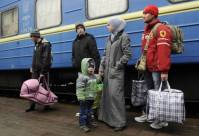Further calls for veto of internally displaced persons law

Another appeal has been addressed to Ukrainian President Petro Poroshenko, urging him to veto the law recently adopted on internally displaced persons.
At a press conference on Wednesday, Serhiy Kovalsky, one of the coordinators of a Coordination Council for organizations for internally displaced persons [IDP] believes that if the law is signed into force it could lead to ‘social catastrophe’.
“They’re against trying to con us. They’re again trying to economize on us, play for time, shift the responsibility to unidentified individuals”.
Olha Skrypnyk, head of the Civic Education Centre Almenda points out that the law contains a number of contradictory points. The term ‘forced migrant’ used for IDP is ambiguous and is not defined by international legislation.
The law also fails to ensure allocation of funding to help IDP and does not specify where people should go for help.
As reported, the law on the legal status of people forced to leave their homes because of the temporary occupation of the Crimea and the anti-terrorist operation in Donbas was passed on June 19.
The draft law adopted had only just been registered, unlike another law which had received public discussion, and its adoption in full was in breach of parliamentary regulations.
Law no. 4998-1 claim to be aimed at resolving the ever-increasing number of IDP. It unfortunately does nothing of the kind and human rights groups and activists working directly with people displaced have either demanded serious amendments or asked President Petro Poroshenko to veto it.
The bill only covers the Crimea and the areas where anti-terrorist operation are or have been carried out. There have already been terrorist attacks by the Kremlin-backed militants on railways, a railway bridge and others. If these become more serious and frequent, then people will surely begin fleeing their homes from those places as well.
The law claims to need no additional government spending which seems wildly unrealistic unless it was seen only as a smoke screen passed to pretend that the government was doing something. It also makes unwieldy demands, effectively requiring people who may have left their homes in great haste to ‘prove’ that they were displaced.
There are also a number of provisions which would be likely to lead to corruption or simply leave people without any help with accommodation since such help would be denied if the people do not agree to the place proposed. Such demands may be realistic if a person is fleeing for a week or two. They are not necessarily reasonable in the present situation where people have no idea when they will be able to return. In such a situation, they will clearly want to consider other factors, such as work or educational opportunities, etc. With the law in its current form, they go where sent, or face having to find a place to stay themselves.





